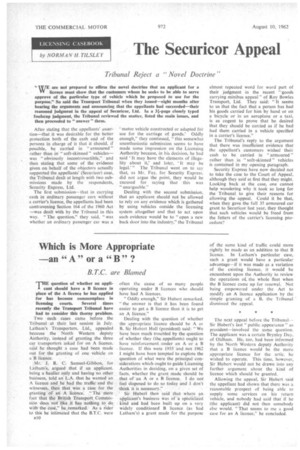The Securicor Appeal
Page 44

If you've noticed an error in this article please click here to report it so we can fix it.
Tribunal Reject a " Novel Doctrine"
LICE\ SING CASEBOOK by NORM ANIL THSLE Y " WE are not prepared to atfimt the novel doctrine that an applicant for a licence must show that the customers whom he seeks to be able to serve approve of the particular type of vehicle which he proposed to use for the purpose." So said the Transport Tribunal when they issued—eight months after hearing the arguments and announcing that the appellants had succeeded—their reasoned judgment in the appeal of Securicor, Ltd. In a 31-page closely typed foolscap judgment, the Tribunal reviewed the matter, listed the main issues, and then proceeded to "answer" them.
After stating that the appellants' assertion—that it was desirable for the better protection both of the cash and of the persons in charge of it that it should, if possible, be carried in " armoured " rather than in " soft-skinned " vehicles— was "obviously incontrovertible," and then stating that some of the evidence given on behalf of the objectors actually supported the appellants' (Securicor) case, the Tribunal dealt at length with two submissions made by the respondents, Security Express, Ltd.
The first submission—that in carrying cash in ordinary passenger cars without a carrier's licence, the appellants had been contravening Seetion 164 of the 1960 Act —was dealt with by the Tribunal in this way. "The question," they said, "was whether an ordinary passenger car was a motor vehicle constructed or adapted for use for the carriage of goods.' Oddly enough," they continued, "this somewhat unenthusiastic submission seems to have made some impression on the Licensing Authority because, in his decision, he had said It may have the elements of illegality about it,' and later, It may be legal'" The Tribunal went on to say that, as Mr. Fay, for Security Express, did not argue the point, they would be excused for saying that this was "unarguable."
Dealing with the second submission. that an applicant should not be allowed to rely on any evidence which is gathered by using vehicles outside the licensing system altogether and that to act upon such evidence would be to " open a new back door into the industry," the Tribunal
almost repeated word for word part of their judgment in the recent " goods carrying minibus appeal" of Roy Bowles Transport, Ltd. They said: " It seems to us that the fact that a person has had his goods carried for him by hand or on a bicycle or in an aeroplane or a taxi, is as cogent to prove that he desired that they should be carried as if he had had them carried in a vehicle specified in a carrier's licence."
The Tribunal's reply to the argument that there was insufficient evidence that the appellant's customers wished their cash to be carried in " armoured " rather than in " soft-skinned " vehicles is contained in my opening paragraph.
Security Express have now decided not to take the case to the Court of Appeal, although they said at first that they might. Looking back at the case, one cannot help wondering why it took so long for the Tribunal to give their reasons for allowing the appeal. Could it be that, when they gave the full 35 armoured car grant to Securicor last year, they thought that such vehicles would be freed from the fetters of the carrier's licensing procedure?
















































































































